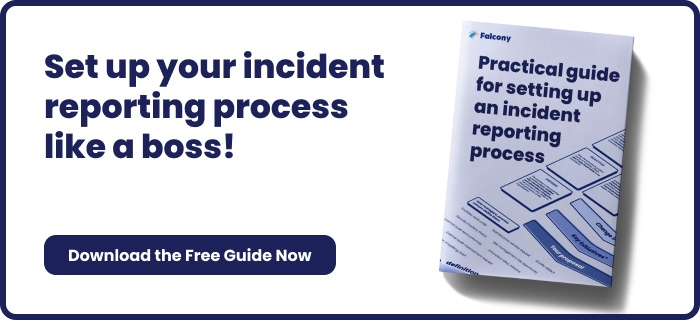In today's fast-paced and interconnected world, incidents and disruptions can occur at any time,...
15 Issues And Incidents All Ports Need To Record To Increase Involvement
Regular incident reports at ports will ensure faster issue resolution times. This will prevent issues from snowballing and placing port workers at risk, or resulting in costly operational delays. Here are 15 issues and incidents that ports need to report.
1. Safety at work reports
The safety of port workers should always be a top priority. There are plenty of potential hazards on the ground that require constant monitoring and securing.
With the correct incident reporting software, port workers can immediately report any safety hazards. This way, each worker can be actively involved in maintaining safe working conditions.
2. Maintenance-related tasks
Any areas or equipment requiring maintenance should be reported by workers on the ground. Routine maintenance will prevent future risks to safety and scheduling delays.
Prevention is better than reacting on incidents!
3. Damaged goods
Massive amounts of goods travel through ports every day. Chances are, some goods will inevitably get damaged in transit.
Immediate action, thorough incident reports of damaged goods are necessary to determine the cause of the damage and prevent a recurrence.
4. Damaged containers & vehicles entering or leaving the port
Similarly, incident reports of damages to containers and vehicles interacting with the port will help determine the cause of the damage and prevent a recurrence.
Detailed incident reports will ensure that transport companies are not held liable for damage they did not cause.
5. Roll-on & Roll-off inspections (RO/RO)
RO/RO vessels transport highly valuable goods, namely cars and large vehicles. All equipment and procedures therefore require regular inspection to ensure that operations remain without incident.
6. Lift-on & Lift-off inspections (LO/LO)
Similarly, LO/LO vessels and procedures require certain essential equipment to perform the manoeuvres. To ensure that no valuable goods are damaged in transit, this equipment will require routine inspections along with incident reports to prevent any costly malfunctions.
7. Man Overboard (MOB) inspections
MOB inspections ensure that all safety equipment is up to scratch and ready to be deployed in case of an emergency. These kinds of inspections and incident reports could directly save lives! So, it is crucial to perform and keep a record of them.
8. Incident reports
Any incidents negatively impacting personnel safety or port scheduling require immediate reporting for swift resolution and recurrence prevention.
Ensuring that all staff members have access to a platform where they can report any kind of incident will mean that you can catch problems early.
9. Near-Miss reports
Any close calls require reporting so that you avoid similar risky situations in the future. Near-miss reports will give port managers valuable information on potential weak spots that need assessing and reinforcing.
10. Continuous improvement ideas
This will encourage workers to become actively involved in bettering their working environment. No one has a better idea of what needs improving than the workers on the ground. Empower them with a platform on which to share their ideas. This will increase involvement as well as operations.
11. Reclamations
Keep track of good reclamations using a top-quality reporting software to ensure every item is kept track of. A thorough “ paper” trail will ensure that your transit company isn’t unfairly held liable for missing goods.
12. Observation reports made by port personnel & port visitors
Encourage any person on the ground to report on anything of interest they witness to stay ahead of issues. Continuous observation will ensure that any issues are caught and rectified early.
13. Equipment reports
Equipment malfunctions or damages can be dangerous or cause costly damages to goods. Good equipment is essential to the smooth running of a port.
A platform on which to conduct and store regular equipment reports will help prevent costly incidents.
14. Port system failures
System failures can grind entire port operations to a costly standstill. It is important to keep track of the cause and duration of every system failure.
This will prevent repeat incidents and help provide detailed reports to customers waiting on the delivery of their goods!
15. Accident reports
Any accidents that occur in the port should be thoroughly documented. This will help determine the root cause of every incident so that you can resolve and prevent it from recurring. It will also give an idea as to who should be held liable for a costly accident.
Final thoughts
Ports have such a high amount of traffic, goods and people entering and leaving it every day that it's almost impossible to imagine that incidents wouldn't happen. Because incidents and issues do happen it is crucial to be prepared on what these could be, and take preventative actions on the critical areas identified. That way the port will be safer for all stakeholders and goods moving through it continuously.
Are you looking for a tool to improve safety, risk, efficiency management, feedback, as well as other reactive and preventative reporting processes in your organisation? Falcony | Observe ticks all the boxes for low-threshold reporting, analytics and follow-up actions. Is easy to customise, enables real dialogue, anonymous reporting, and a lot more.
We are building the world's first operational involvement platform. Our mission is to make the process of finding, sharing, fixing and learning from issues and observations as easy as thinking about them and as rewarding as being remembered for them.
By doing this, we are making work more meaningful for all parties involved.
More information at falcony.io.

Related posts
How Ports And Port Operators Can Increase User Involvement
Ports are busy places. So, when it comes to incident reporting, it really needs to be an “all eyes...
Integrate Incident Reporting Downwards
Incident reporting is an essential part of creating a workplace environment that is safe and...





